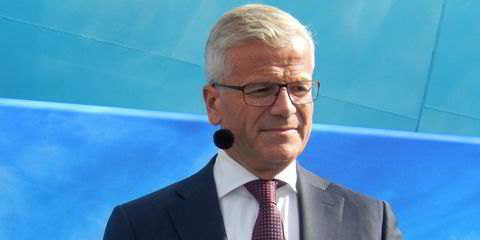VLCC rates have been holding steady so far this month due to one-off factors on the tonnage supply side.
But a fall is still viewed as inevitable when stored oil starts to move off anchored tankers, Fearnley Securities said.
"The VLCC market continues like a clock set at Worldscale 60, which it has been doing for all of June so far," said analysts Espen Landmark Fjermestad, Peder Nicolai Jarlsby and Ulrik Mannhart.
"At the same time, suezmax/aframax rates are closing in on operating costs, pointing to the relative strength of the VLCCs presently."
The Norwegian investment bank assesses VLCC rates from the Middle East Gulf to South Korea as stable at $51,200 per day — down less than 2% month on month.
In contrast, suezmaxes are down 75% from a month ago at $9,500 per day, and aframaxes off 85% at $6,200 per day.
The number of fixtures in the Middle East Gulf has yet to pass 100 for June, with loading dates being very late in the month, the analysts said.
Instead, there are favourable factors occurring on the supply side, with the Ocean Tankers fleet basically off the market due to the collapse of trader parent Hin Leong in Singapore, the analysts added.
Sanctions and congestion
And some of the larger operators, including oil majors, are steering clear of vessels with a Venezuelan link due to US sanctions.
"Finally, there are significant delays outside of Chinese ports such as Shandong, with reports of congestion in excess of 20 days," Fearnley said.
But the market will need to absorb floating barrels as they come off tankers in Asia and then in the North Sea, it added.
The firm counts 170m barrels held on VLCCs alone, plus nearly 70m more barrels on suezmaxes.
"Both floating and onshore stocks will need to be unwound before buying can return," the analysts said. "Therefore, we continue to believe that the market comes off in the coming months."
Fearnley's estimates for crude tanker owners' third-quarter Ebitda are 30% below consensus, and 40% below consensus for product tankers.
Cleaves Securities head of research Joakim Hannisdahl said VLCC spot rates held up remarkably well last week, with "support in the Atlantic and resilient owners" in the Middle East Gulf.
He described suezmax numbers as marginally above operating expenses. This means split cargoes are still an attractive alternative for VLCC charterers.
He added that there is "still a lot of focus on potential US sanctions on Venezuelan traded ships, with some charterers already excluding such vessels from bidding on cargoes".






